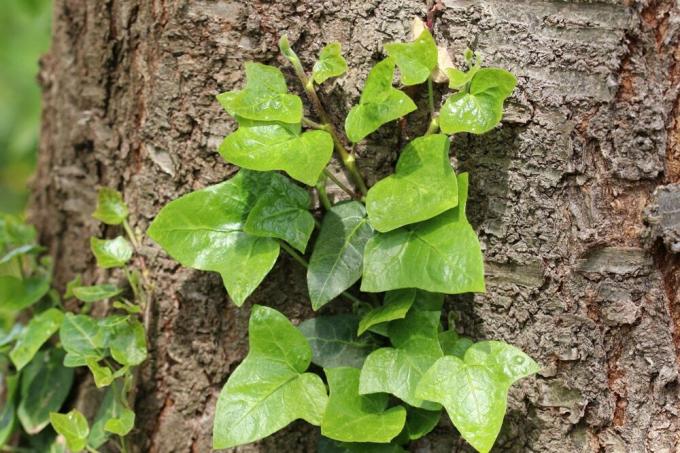

Table of contents
- Nettle broth
- Curd and soft soap
- garlic broth
- Manure made from field horsetail
- neem oil
- Bracken broth
- Brew from oregano
- baking soda
- Ivy broth
- Natural predators
Aphids are widespread plant pests and do not stop at herbs either. Within a short time, the small insects can grow into large colonies and damage the delicate leaves and young shoots. In addition, aphids can often transmit dangerous pathogens when sucking. Countermeasures must therefore be taken promptly. Natural treatment methods without harmful chemicals are perfect for this, both for human health and for the environment.
Nettle broth
A nettle decoction is a biological household remedy that has been used successfully for a long time to combat aphids. Both fresh and dry leaves can be used to make a decoction. Sprayed in its pure form, the cold nettle extract helps against a normal to moderately severe infestation. Ideally, the mixture can infuse well after it has been prepared, but it should not ferment. The fermentation process sets in quickly, especially during the summer months, during which time the brew should be placed in the refrigerator. The broth can develop an unpleasant odor, which can be mitigated with a handful of rock flour.
- 200 grams of fresh leaves are required
- Alternatively, use 20 grams of dried nettles
- Roughly chop the nettles
- Soak in 1 liter of water for two days
- Then sieve off all parts of the plant
- Fill the undiluted brew into a spray bottle
- Spray lice on leaves and stems with it
- Repeat more often if necessary
Tip:
If the batch has started to ferment, it can be used as fertilizer for the herbs and strengthens their immune system to prevent aphid infestation.
Curd and soft soap

Curd and soft soap is a widely used household remedy in the fight against aphids. Since the soap does not contain excess fat, there is no greasy film on the sensitive herbs after use. In addition, these natural soap products contain no fragrances or dyes, and no artificial thickeners are used. Liquid soaps and natural soaps are not suitable as antidotes because they contain fragrances and other ingredients. This would degrade the flavor of the herbs. If the infestation with aphids is very severe, the effectiveness of the soap solution can be intensified with a little alcohol.
- Curd and soft soap in organic quality is ideal
- Cut off about 25-50 grams from the bar of soap
- Amount depends on the number of affected herbs
- Then rub the soap
- Then dissolve in 0.5-1 liter of warm water
- After cooling down, fill the soapy solution into the spray bottle
- Spray affected herbs, but not the soil
- Wash off the soap solution well before consumption
garlic broth

Garlic is also an effective way to combat aphids. As a spice, garlic is a real all-rounder, thanks to the strong odor and essential oils, it is also effective against pest infestation. The garlic broth can be made quickly and also helps with problems with maggots, mites, caterpillars and snails. In addition, this mixture has proven to be helpful against various fungal diseases. Although the smell is very strong, it gets along well with most spicy herbs.
- You will need 50 g of fresh garlic
- Finely chop the garlic cloves
- Then pour over 1.5 liters of boiling water
- Then leave for at least three hours
- Then strain through a tea towel
- Pour the cold liquid into a spray bottle
- Spray affected herbs with undiluted broth
- Then repeat preventively every ten days
Manure made from field horsetail
Horsetail has been used for generations to control garden pests. The herb not only deters the aphids, but also preventively strengthens the immune system of the herbs. In this way, the plants can better withstand an infestation. However, the brew made from field horsetail is only effective in the early stages of an infestation with aphids. When this is very advanced, stronger antidotes are needed.
- 1 kilogram of fresh field horsetail is ideal
- Alternatively, use 200 grams of dried herb
- Soak in two liters of cold water for 24 hours
- Then pour into a spray bottle
- Spray the herbs several times with this
- Then use weekly as a preventive measure
neem oil

Neem oil comes from Asia and is deeply rooted there in Ayurvedic medicine. The helpful oil is sold in health food stores and health food stores. Since neem oil is very strong and also smells, it should never be used undiluted. Otherwise the herbs could be damaged. Due to the intensive mode of action, the aphids are no longer active a few hours after the first application. After a few more applications, the pests disappear completely.
- Mix 1 teaspoon of neem oil with 1 liter of water
- Pour liquid into spray bottle, shake well
- Spray affected plant parts with it once a day
- Carry out several times a day in case of heavy infestation
- Then use preventively at intervals of 10 days
Bracken broth
An effective aphid spray can also be made from the leaves of the bracken fern. It works against all types of lice and can also be used for herbs that thrive in indoor culture. Because this broth is high in potash, it boosts the herbs' immune system just like a fertilizer.
- 100g fresh bracken leaves
- Roughly chop the fern leaves
- Place in a saucepan with 0.5 liters of water
- Cover and simmer at low temperature for 1 hour
- After cooling, sieve parts of the plant through a cloth
- Dilute broth with equal amount of water
- Spray the affected parts of the plant with it
Brew from oregano

Oregano is a popular kitchen herb and is not only good for cooking. The herb contains many essential oils and other substances that repel aphids. Since oregano is already available in most households, the spray can be made quickly and easily.
- It will take 100 grams of fresh oregano
- Alternatively, use 10 grams of dried oregano
- Pour 0.5 liters of boiling water over the leaves
- Let the brew steep for 15 to 20 minutes
- Then sieve off all plant residues
- Then dilute the broth with water in a ratio of 3:1
- Let cool, then pour into spray bottle
- Use daily against the pests
baking soda
Baking soda is a universal household remedy and can be used in many ways. In the garden it is also effective against infestation with aphids. The agent is completely harmless to both humans and nature. Depending on the dosage and the other ingredients, the antidote can be adapted to the severity of the infestation. Then it even helps against stubborn blood, scale and mealybugs.
- Dissolve 1 teaspoon of baking soda in 1 liter of water
- Top up with oil if heavily infested
- Alternatively, you can also add alcohol
Ivy broth

Ivy contains saponins, which are soap-like ingredients. These natural substances are found in various plants and can also be used as an effective home remedy against lice infestation.
- Gather about 40-45 ivy leaves
- Roughly chop the ivy
- Pour into a saucepan with 1 liter of water
- Then cover and simmer for 30 minutes
- Mixture should not foam over
- Then let the broth cool down
- Strain through a tea towel
- Then pour into a spray bottle
- Spray infested herbs daily
- Repeat several times a day for stubborn infestations
Tip:
Since chestnuts also contain saponins, this spray can also be made from them. However, the gardener will have to wait until autumn when the chestnuts begin to ripen.
Natural predators

Aphids can also be fought with the help of natural predators. These welcome beneficials are extremely effective and can consume 400 to 500 aphids a day. In addition, the workload of the gardener is kept within manageable limits. Once the predators have settled, everything will take care of itself.
- Natural predators are ladybird larvae
- Larvae of lacewings and gall midges are also helpful
- Earwigs and parasitic wasps are also included
- Can be attracted to nesting boxes and insect hotels
- These devices can easily be built by yourself
 garden editorial
garden editorial I write about everything that interests me in my garden.
Learn more about aphids

Garlic against aphids: make garlic stock
Aphids usually appear overnight and quickly become a real nuisance. A proven home remedy for lice is garlic broth. The production of the biological crop protection product, which can be used indoors and outdoors, is easy.

Effectively combat aphids on lavender & jasmine
Effective home remedies have even been developed to combat stubborn plant pests. This guide explains how gardeners can rid their jasmine or lavender of lice with inexpensive and environmentally friendly treatments.

Aphid profile: size, food, control
Aphids are among the biggest enemies of every gardener along with snails. In Europe alone there are several hundred species that have fruit, vegetables and ornamental plants as a food source. Some species can be driven away with home remedies that are non-toxic to nature.

Prevent aphids | 6 home remedies to get rid of aphids
Anyone who manages a garden, maintains flower boxes or even has potted plants on their windowsill at home knows them - the aphids. You can find out here how you can avoid the influx of annoying visitors from the outset using simple home remedies.

Fighting lice on raspberries | 13 natural remedies against aphids
Raspberries taste best straight from the bush. However, for a good yield, the fruits and shrubs should be healthy and free from pests. You should do something against aphids in the spring, long before the fruit ripens.

Fight aphids biologically - these 14 home remedies work
Aphids are found almost everywhere. And the small pests are not necessarily very choosy. They suck out the sap of plants and can cause a lot of damage. But you don't have to resort to chemical agents right away. There is a whole range of effective, biological means to effectively combat aphids.
